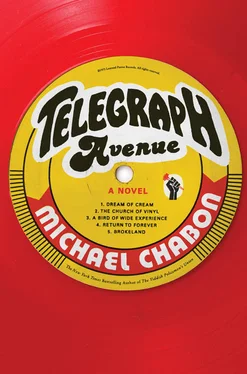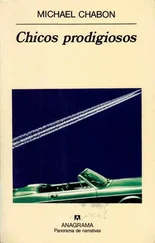1 ...5 6 7 9 10 11 ...118 “What happened?” Luther said to Chan, affecting lightness. Only then, in the wake of posing this awful question, did he begin to feel something like dread. Chan just turned up the volume on the music. “Chan, you did it?”
Luther could see Chan struggling to frame the story of what had transpired inside the Bit o’ Honey Lounge in some way that did not infuriate him. One thing Chandler Flowers hated more than being underestimated for his intelligence was giving evidence of any lack thereof. The light turned green. Luther steered, for mysterious reasons and in the absence of counterinstruction from his companion, toward the image in his mind of that westernmost angel blowing that apocalyptic horn. A minute went by which Joe Beck and his guitar organized according to their own notions of time and its fuzztone passage. At last Flowers emitted, as through a tight aperture, four words.
“Shot off his hand.”
“Left or right?”
“The right hand.”
“He a righty or a lefty?”
“Why?”
“Is Popcorn a righty or a lefty?”
“You are suggesting, if Popcorn Hughes turns out to be right-handed, maybe I messed this job up a little less. Because at least now Popcorn only has the hand he doesn’t use.”
Luther reflected as they rumbled up Tunnel Road toward the spot where, invisibly as a decision turning bad, it became the Warren Freeway. “No,” he conceded at last.
After this, they did not speak at all. Luther went on reflecting. At seven in the morning, Monday, he was expected to report to a rented soundstage down in Studio City to film his first scenes for Strutter , a low-budget action movie in whose lead he had recently been cast. He was driving around tonight in the up-front money from that job. There was ten grand yet to come, and after that, anything: sequels, endorsements, television work, the parts that Jim Brown was too busy to take, a costarring role with Burt Reynolds. Now, through some damned interlocking of bravado, loyalty, and the existential heedlessness that had helped him to become the 1972 middleweight karate champion of the world, Luther had knotted his pleasantly indistinct future like a sackful of kittens to the plunging stone of Chan Flowers.
Tonight had gone wrong, but even if Popcorn, as planned, had caught a fatal chestful of lead shot and pumped out his life in a puddle under a table by the stage, the situation would have been no better. True, the seed of Panther legend that Chan Flowers hoped to cultivate as Chan “the Undertaker” Flowers, killer of men—a real one, not some make-believe hard-ass in a low-budget grind-house feature—would have been planted. True, the ongoing mental distress caused to Huey Newton by the continued existence of Popcorn Hughes might have been assuaged. But there still would have been no benefit whatsoever to Luther Stallings. Success of the mission would have been another kind of failure, even deeper shit than Luther was in now.
Luther had no politics, no particular feelings toward drug dealers like Popcorn or toward the Black Panthers who had targeted them. He did not care who controlled the city of Oakland or its ghetto streets. He had seen Huey Newton once in his life, black leather jacket, easy smile, talking some shit about disalienation at a house party in the Berkeley flatlands, and had marked him right away as just another stylist of gangster self-love. Luther Stallings, future star of blaxploitation and beyond, had no call to be here, no interest in the outcome either way. Chan asked him to drive, so Luther drove. Now, instead of a murder in his rearview mirror, there was the bloody trail of a fuckup. Meanwhile, the image of the golden angel of the Mormons soloing atop his spire worked its strange allure on Luther’s imagination.
“Take a left,” Chan said as they rolled off the freeway at the Park Avenue exit.
Luther was about to protest that a left turn would lead them away from the temple when he realized that he had no real reason to want to go to that place. The vague longing to bear some kind of witness to the glory of the angel Moroni winked out inside him, crumbled like ash. Luther aimed the Toronado up Joaquin Miller Road.
“Where we going?” he said.
“I need to think,” said the smartest boy in the room. He stared out at the night that streamed like a downpour across the windshield. Then, “Shut up.”
“I didn’t say nothing,” Luther said, though he most definitely had been tossing around some combination of words along the lines of Ain’t it a little late for that now?
“Yeah, I was in that Dogpile one time,” Moby was saying. “Down in L.A.?”
Moby was one of the noontime regulars. He was a lawyer, none too unusual a career path for a three-hundred-dollar-a-month abuser of polyvinyl chloride, except that Moby’s clients were all cetaceans. His real name was Mike Oberstein. He was notably—given the moniker—white and size 2XL. Wore his longish hair parted down the center and slicked back over his ears in twin flukes. Moby worked for a foundation out of an office in the same building as Archy’s wife, bringing action against SeaWorld on behalf of Shamu’s brother-in-law, suing the navy for making humpbacks go deaf. He was a passionate and free-spending accruer of fifties and sixties jazz sides.
“It was pretty tight,” Moby added.
“Was it?” Nat said. Giving a bottle to Rolando English, who sat fastened safely into an infant carrier, propped up on the counter by the cash register. Nat kept his gaze fixed on the baby so that, Archy understood, he would not have to kill Mike Oberstein with gamma rays shot out of his eyeballs. “Was it bangin ?”
Archy knew—could not help knowing all the man’s rants and treatises on the subject—how it bothered Nat that Moby tried so hard (to be honest, probably wasn’t even trying anymore) to sound like he was from the ’hood, from round the way , as Moby would have put it, even though he was a sweet-natured white guy from Indiana, someplace.
“It was straight- up bangin,” Moby said, so well armored in his sweetness and his imaginary Super Fly fur coat that he was impervious if not oblivious to the eyeball lightning Nat was always forking in his direction. “No joke. Found me this crazy side called, Nat, get this, Jimmy Smith Live in Israel . Thought it was a myth. I been looking for that for, like, years.”
Nat nodded, watching the formula steadily disappear from the bottle, while in his imagination, as Archy could infer by the knot of Nat’s shoulders, he took a pristine pressing of Jimmy Smith Live in Israel (Isradisc, 1973) out of its sleeve and snapped it over his knee. Twice, into quarters. Then handed it back to Moby without a word, not even needing to say, Man , fuck Dogpile. And the motherfucking Dogpile blimp.
“Part I don’t understand, all due respect, is why y’all act like it some kind of invasion ,” said the King of Bling. “Dogpile coming into this neighborhood.”
Garnet Singletary, Baby Rolando’s grandfather, was sitting beside Moby at the glass display counter that ran nearly half the length of the south wall of the store, at the end farthest from the window, in order to preserve a certain distance between himself and the parrot. Fifty-Eight, the African grey, sat perched on the shoulder of Cochise Jones, who occupied his usual stool tucked into the corner by the window, Mr. Jones with that inveterate hunch to his spine from fifty years conducting experiments at the keyboard of a Hammond B-3. Decades of avian companionship had raised a fuzz of claw marks at the shoulders of Mr. Jones’s green leisure suit, tussocks on the padded polyester lawn. Restless as a radio telescope, the parrot’s head with its staring eye plowed the universe for invisible signs and messages. Every so often Fifty-Eight, whose public utterances tended to be musical, would counterfeit the steely vibrato of his owner’s B-3, break out into a riff, a stray middle eight, the bird programming its musical selections with an apparent randomness in which Singletary, who feared and admired the bird, claimed to find evidence of calculation and ironical intent.
Читать дальше
Конец ознакомительного отрывка
Купить книгу












